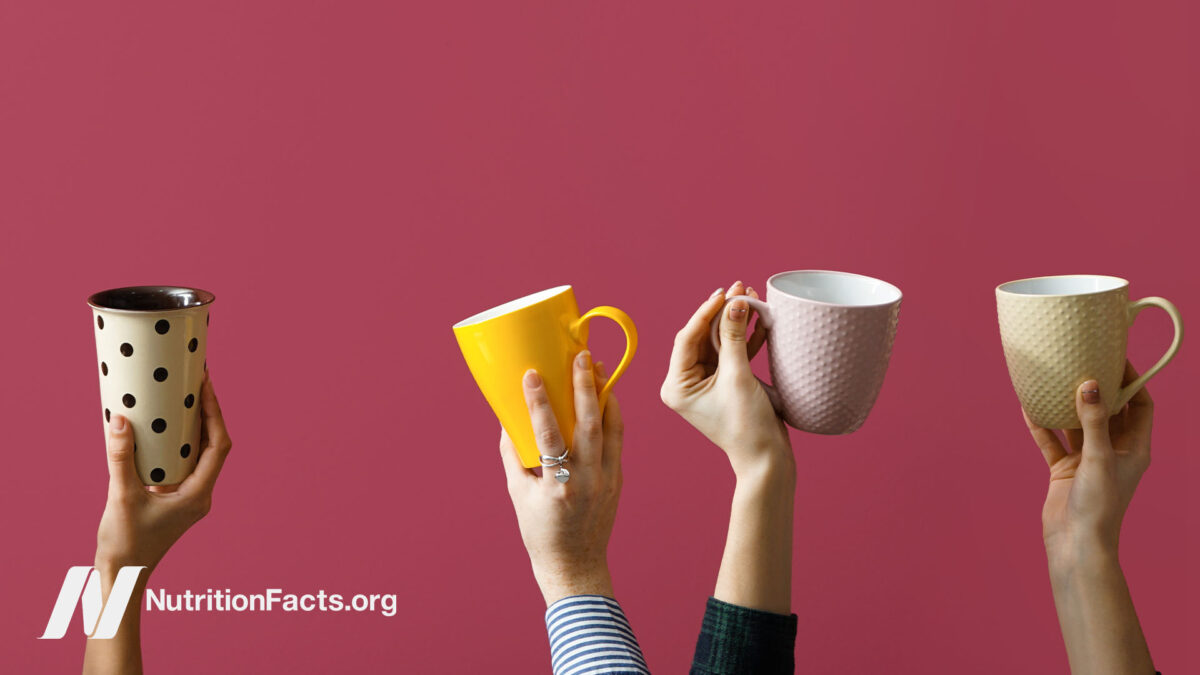
Coffee
The Beverage Guidance Panel, assembled to provide recommendations on benefits and risks of various beverage categories, found tea and coffee—preferably without creamer or sweetener—tied as the number-two healthiest beverages, second only to water.
Indeed, studies have shown many potential benefits to coffee consumption. For those infected with hepatitis C, for example, drinking coffee may reduce DNA damage, increase the clearance of virus-infected cells, and slow the scarring process, which may help explain coffee’s apparent role in reducing liver disease progression risk.
What about coffee and Parkinson’s? Consumption seems to be associated with about one-third lower risk. The key ingredient appears to be the caffeine, since tea also seems protective and decaf coffee does not. And for treating Parkinson’s? Giving Parkinson’s patients the caffeine equivalent of two cups of coffee a day significantly improved movement symptoms within three weeks.
The National Institutes of Health–AARP Diet and Health Study, the largest-ever prospective study conducted on diet and health, found that people who drank six or more cups of coffee per day had a 10 to 15 percent lower mortality rate due to fewer deaths from heart disease, respiratory disease, stroke, injuries, accidents, diabetes, and infections. However, when a study looked at people 55 and younger, the opposite effect was found: Drinking more than six cups of coffee daily was found to increase the risk of death. The bottom line, based on all the best studies to date, is that coffee consumption may indeed be associated with a small reduction in mortality, on the order of a 3 percent lower risk of premature death for each cup of coffee consumed daily.
We used to think caffeine might increase the risk of atrial fibrillation, an irregular heart rhythm, but studies dispelled that myth. Moreover, “low-dose” caffeine, defined as drinking fewer than about six cups of coffee a day, may even have a protective effect on heart rhythm.
Harvard University researchers found that people who drank two or more cups of coffee daily appeared to have about only half the suicide risk compared to non-coffee drinkers, and a Kaiser Permanente study found that people who drank more than six cups a day were 80 percent less likely to commit suicide, though drinking eight or more cups daily has been associated with increased suicide risk.
Coffee is not for everyone, though. People with glaucoma, epilepsy, and gastroesophageal reflux disease (GERD) may want to stay away from caffeinated coffee.
For substantiation of any statements of fact from the peer-reviewed medical literature, please see the associated videos below.
Popular Videos for Coffee

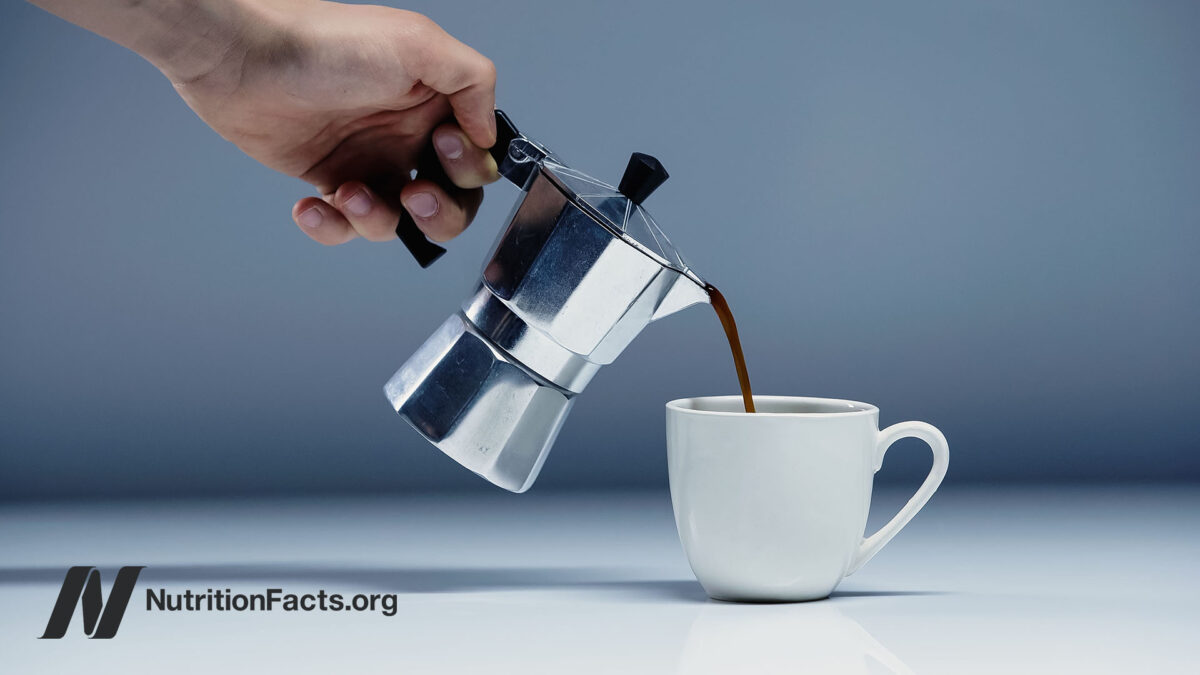
The Healthiest Way to Drink Coffee
Why do those who drink filtered coffee tend to live longer than those who drink...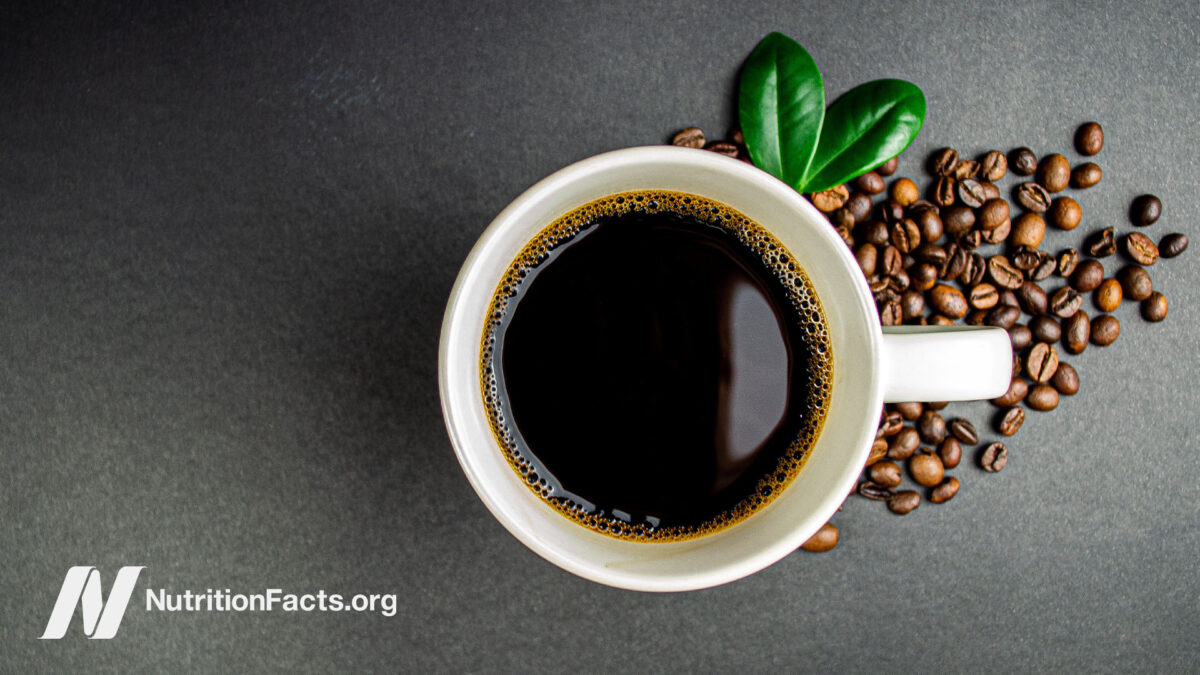
Does Coffee Help Boost Autophagy and Lifespan?
In terms of longevity, three cups of decaf coffee appeared to be just as protective...
Does Coffee Inhibit Iron Absorption? What Are the Effects of Having Too Much Iron?
Coffee and common herbal teas impair iron absorption, which may help explain some of their...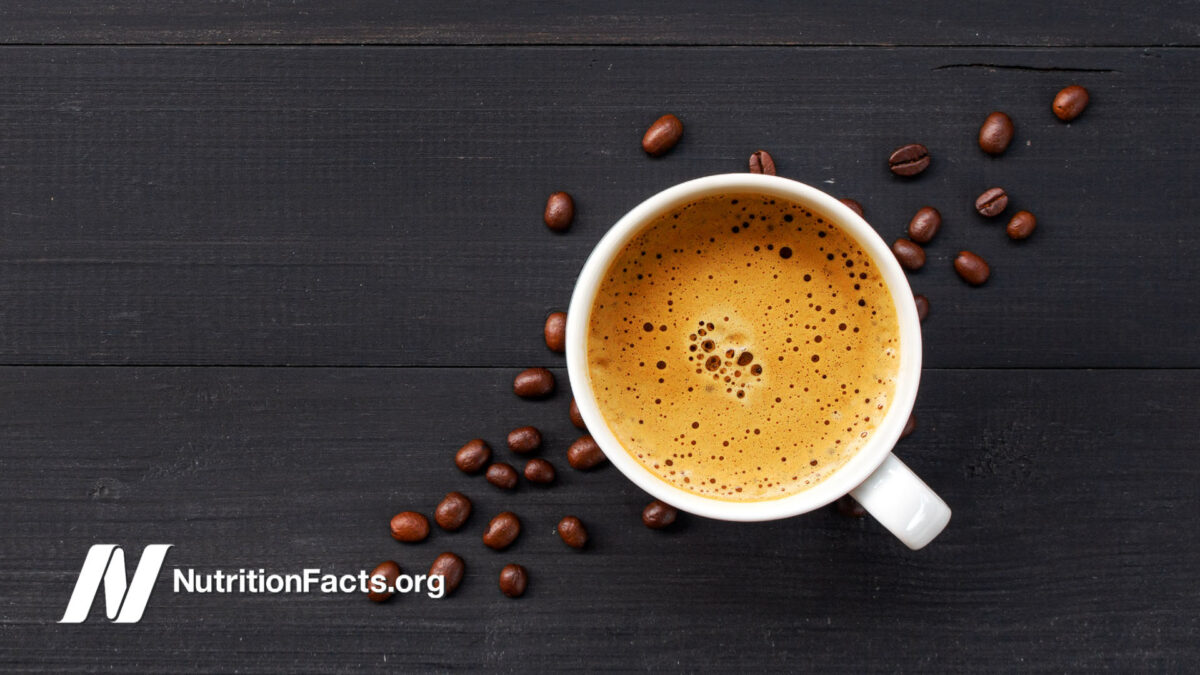
Coffee Put to the Test for Treating Parkinson’s Disease
Coffee can improve Parkinson’s symptoms within three weeks compared to placebo, but do the benefits...
Do the Health Benefits of Coffee Apply to Everyone?
Genetic differences in caffeine metabolism may explain the Jekyll and Hyde effects of coffee.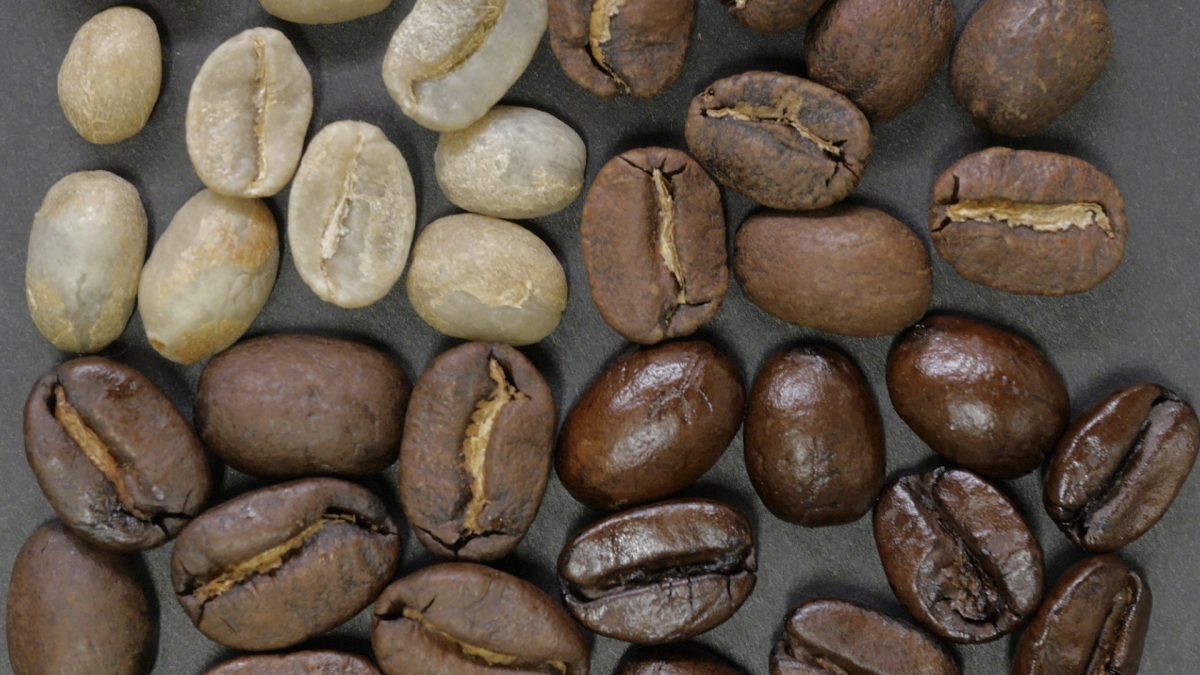
Which Coffee Is Healthier: Light vs. Dark Roast?
Dark roast coffee is more effective than light roast coffee in reducing body weight.
Does Low-Acid Coffee Cause Less Acid Reflux?
What is low-acid coffee, and does it help those who suffer from acid reflux, heartburn,...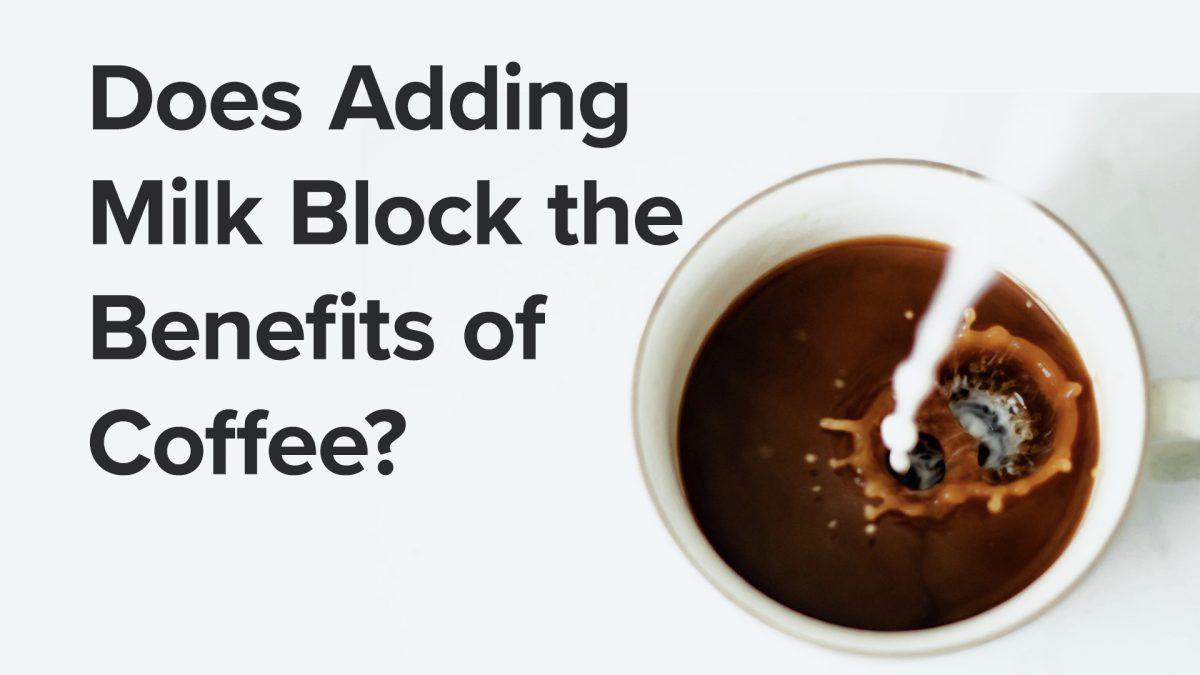
Does Adding Milk Block the Benefits of Coffee?
How to choose the healthiest coffee, and the effects of adding milk vs. soymilk.
Does Coffee Affect Cholesterol?
New data suggest even paper-filtered coffee may raise “bad” LDL cholesterol.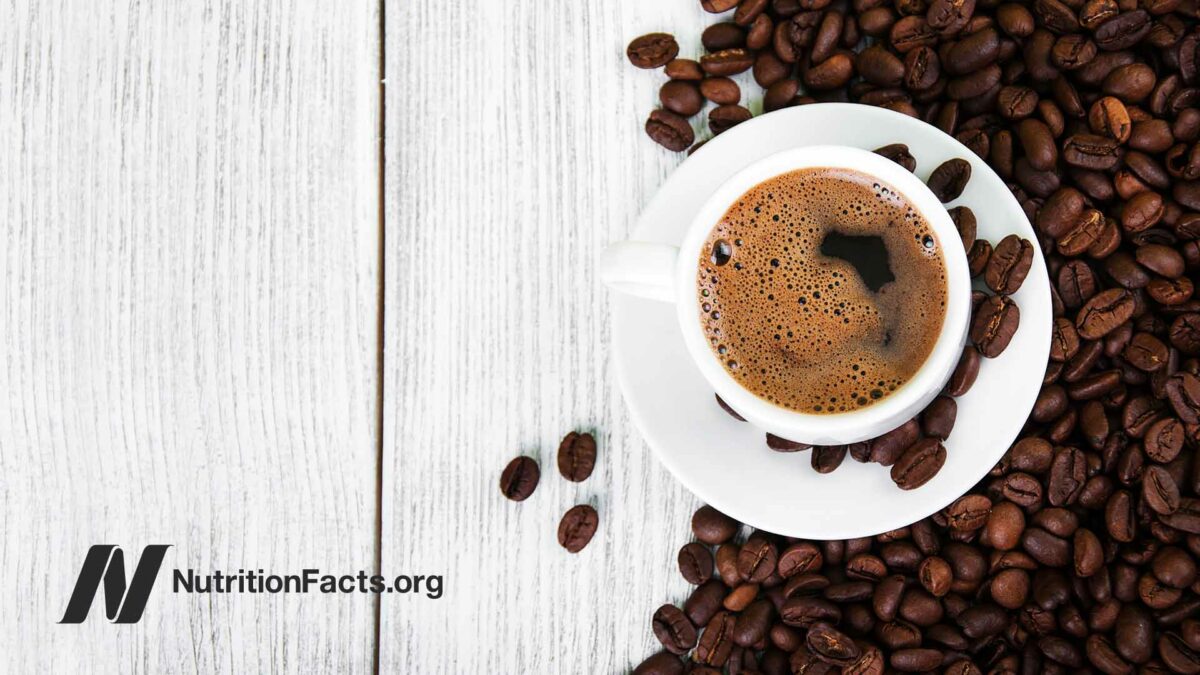
Coffee and Mortality
What effect does coffee and tea consumption have on longevity, cancer risk, GERD reflux, bone...
Preventing Liver Cancer with Coffee
Based on studies linking coffee consumption with lower liver cancer risk, coffee is put to...
Coffee and Artery Function
The new dietary guidelines for beverages recommend tea and coffee second only to water in...
Coffee and Cancer
Coffee consumption is associated with a modest reduction of total cancer incidence.All Videos for Coffee
-

The Benefits of Black and Green Teas for Brain Waves
Of all the plants in the world, why has the tea plant become the most popular beverage in the world?
-

Who Should Avoid Coffee?
There are certain medical conditions that are worsened by coffee intake.
-

The Healthiest Way to Drink Coffee
Why do those who drink filtered coffee tend to live longer than those who drink unfiltered coffee?
-

Does Coffee Help Boost Autophagy and Lifespan?
In terms of longevity, three cups of decaf coffee appeared to be just as protective as three cups of regular coffee.
-

How Much Caffeine Is Safe During Pregnancy?
Pregnancy greatly reduces our ability to metabolize caffeine.
-

How to Get Enough Polyphenols for Life Extension
Is the link between flavonoid consumption and longevity cause-and-effect, and are all sources of flavonoids equally healthy?
-

Do Collagen Supplements Work for Skin Aging?
I assumed that collagen proteins would get completely broken down in the digestive tract, but I was wrong.
-

How to Delay the Age of Menopause with Diet and Lifestyle Factors
Approximately half of the variability of age of menopause among women is explained by genetics. What behaviors or circumstances can help explain the rest?
-

How Not To Age – Live Presentation
In this live lecture, Dr. Greger offers a sneak peek into his latest book, How Not to Age, a New York Times Best Seller.
-

Caffeine Shampoo and Rosemary Oil for Hair Growth
I cover natural topical treatments for hair growth, including pumpkin seed oil, caffeine, green tea, pyrithione zinc, ginger, Chinese knotweed, and rosemary.
-

How to Get a Good Night’s Sleep Without Sleeping Pills
Taking less than just 18 Ambien-class sleeping pills in an entire year may triple the risk of dying prematurely.
-

Does Coffee Inhibit Iron Absorption? What Are the Effects of Having Too Much Iron?
Coffee and common herbal teas impair iron absorption, which may help explain some of their benefits.
-

Potential Vitamin and Mineral Deficiency Risks on a Vegan Diet
What is the best way to get the nutrients of concern on a plant-based diet?
-

Coffee Put to the Test for Treating Parkinson’s Disease
Coffee can improve Parkinson’s symptoms within three weeks compared to placebo, but do the benefits last?
-

Fasting for Irritable Bowel Syndrome
More than half of IBS sufferers appear to have a form of atypical food allergy.
-

Optimizing Water Intake to Lose Weight
Two cups of cold water on an empty stomach a few times a day for weight loss.
-

The SARS Coronavirus and Wet Markets
The role live animal markets and the trade in exotic animals have played in the emergence of deadly coronavirus outbreaks.
-

What Are the Best Foods?
A review of reviews on the health effects of animal foods versus plant foods.
-

What Are the Best Beverages?
A review of reviews on the health effects of tea, coffee, milk, wine, and soda.
-

Alternate-Day Intermittent Fasting Put to the Test
Does every-other-day-eating prevent the metabolic slowing that accompanies weight loss or improve compliance over constant day-to-day calorie restriction?
-

Do the Health Benefits of Coffee Apply to Everyone?
Genetic differences in caffeine metabolism may explain the Jekyll and Hyde effects of coffee.
-

Does Low-Acid Coffee Cause Less Acid Reflux?
What is low-acid coffee, and does it help those who suffer from acid reflux, heartburn, and indigestion?
-

Which Coffee Is Healthier: Light vs. Dark Roast?
Dark roast coffee is more effective than light roast coffee in reducing body weight.
-

Are There Benefits of Energy Drinks?
The effects of Red Bull and Monster brand energy drinks on artery function and athletic performance.
-

Are There Risks to Energy Drinks?
Red Bull and Rockstar brand energy drinks are put to the test.
-

Does Adding Milk Block the Benefits of Coffee?
How to choose the healthiest coffee, and the effects of adding milk vs. soymilk.
-

Does Coffee Affect Cholesterol?
New data suggest even paper-filtered coffee may raise “bad” LDL cholesterol.
-

Viagra and Cancer
What is the role of erectile dysfunction drugs like Cialis and Levitra in the promotion and progression of prostate cancer and melanoma?
-

Apple Peels Put to the Test for Chronic Joint Pain
Are the health benefits associated with apple consumption simply due to other healthy behaviors among apple-eaters?
-

How Much Arsenic in Rice Is Too Much?
What are some strategies to reduce arsenic exposure from rice?
-

The Benefits of Açai vs. Blueberries for Artery Function
What are the effects of açai berries, cooked and raw blueberries, grapes, cocoa, green tea, and freshly squeezed orange juice on artery function?
-

How to Lower Lead Levels with Diet: Thiamine, Fiber, Iron, Fat, Fasting?
Iron, zinc, oil, and even doughnuts are put to the test to see if they can block lead absorption.
-

Club Soda for Stomach Pain and Constipation
Is carbonated water good or bad for heartburn, dyspepsia, and bowel regularity?
-

Is Something in Tobacco Protective Against Parkinson’s Disease?
The tobacco industry points to dozens of studies purporting to show tobacco use is associated with a lower incidence of Parkinson’s disease.
-

Caution: Anti-Inflammatory Foods in the Third Trimester
For the same reason that anti-inflammatory drugs like aspirin and ibuprofen are advised against during late pregnancy, anti-inflammatory foods may increase the risk of premature closure of the ductus arteriosus.
-

Coffee and Mortality
What effect does coffee and tea consumption have on longevity, cancer risk, GERD reflux, bone fractures, glaucoma, sleep quality, and atrial fibrillation (irregular heartbeat)?
-

Does Chocolate Cause Weight Gain?
Big Candy boasts studies showing that those who eat chocolate weigh less than those who don’t, but what does the best science show?
-

Aspartame and the Brain
The reason artificially sweetened beverages have been associated with depression may be because of psychological disturbances recently tied to aspartame (“Equal” or “NutraSweet”).
-

Coffee and Artery Function
The new dietary guidelines for beverages recommend tea and coffee second only to water in healthfulness, but what about concerns they might impair the function of our endothelium?
-

Preventing Liver Cancer with Coffee
Based on studies linking coffee consumption with lower liver cancer risk, coffee is put to the test to see if it can help reduce liver damage in those with hepatitis C.
